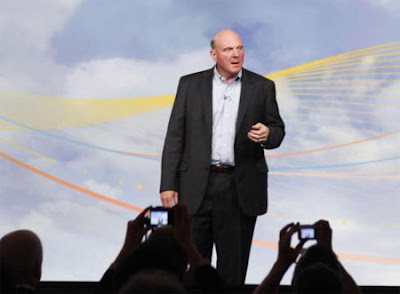by Michael Liedtke, Associated Press
Sept 14, 2011
Microsoft CEO Steve Ballmer assured analysts on Wednesday that Windows remains the software maker's financial foundation, even though slowing personal computer sales are raising worries about the operating system's ability to adapt to the new ways people and business are using technology.
"Windows is at the center of our 'go-forward' strategy," Ballmer said during a presentation held in Anaheim, near Disneyland. "We feel very comfortable that this is a smart thing to do for our customers and the smart thing to do for our shareholders."

The Associated Press monitored Microsoft's analyst meeting via webcast.
Ballmer's upbeat tone reflected a positive buzz surrounding Windows 8, a version due out next year that Microsoft is touting as the most radical makeover of its lucrative operating system since 1995. Windows 8 is being designed to run on devices that boot up faster and work on touch-screen computer tablets, as well as on PCs that depend on keyboards and mice.
The overhaul is Microsoft's most aggressive response to the tablet craze that Apple Inc. set off with its release of the iPad in 2009.
Since then, Apple has sold more than 28 million iPads and analysts expect tens of millions more to be sold by the time Windows 8 is ready to be shipped. Microsoft isn't saying when Windows 8 will go on sale, but analysts expect it to hit the market at some point between July and the 2012 holiday shopping season.
In the meantime, Microsoft is still promoting Windows 7, which has sold nearly 450 million copies since its 2009 release. It just recently surpassed Windows XP— a decade-old operating system — as the most widely used version of Microsoft's operating systems, according to company estimates.
To build the excitement for what's coming next, Microsoft provided its most extensive demonstration of Windows 8 so far Tuesday during a packed meeting with applications developers. It gave away 5,000 Samsung tablets running on a preliminary version of Windows 8 and also is allowing anyone to take the software for a test spin if they want to install it on their own machines. By Wednesday morning, Ballmer said more than 500,000 copies of Windows 8 had been downloaded.
"The initial reaction has been all we have been hoping for," Ballmer told analysts.
That may be so, but Microsoft still appears to have work to do to win back investors who have become increasingly convinced that the company has lost its competitive edge as Google Inc. emerged as the Internet's most powerful player and Apple Inc. shaped mobile computing trends with the iPhone and iPad tablet.
The Internet and mobile devices are now seen as more compelling franchises with greater future potential than the PC business that Microsoft has milked since the 1980s with Windows and its Office suite of software.
Since Google went public in August 2004, its stock has increased by more than six fold while Microsoft's shares have dipped 2 percent. And since Apple released the first iPhone in June 2007, its stock has more than tripled while Microsoft's shares have backtracked 11 percent. That shift enabled Apple to surpass Microsoft as the world's most valuable technology company.
Microsoft shares closed Wednesday at $26.50, up 46 cents.
The lackluster performance of Microsoft's stock has intensified the pressure on Ballmer, an exuberant leader who succeeded company co-founder Bill Gates as CEO in 2000. With Microsoft's revenue growth slowing, Ballmer has curbed spending and even laid off workers to save money. The penny-pinching helped Microsoft boost its revenue to $774,000 per employee in its last fiscal year ending in June compared with $622,000 per worker in fiscal 2006, Microsoft boasted Wednesday.
Ballmer, 55, is betting Windows 8 will help Microsoft catch up in tablets and renew demand for PCs that can be operated with a touch of the finger as well as with the traditional navigation tools.
Microsoft is also scrambling to build a mobile version of Windows that will be more widely embraced in the smartphone market, where it has fallen behind Google's Android operating system as well as Apple's iPhone system. "I don't love where we are now, but I am very optimistic of where we can be," Ballmer said.
The company's proposed $8.5 billion acquisition of Internet phone and video service Skype is expected to become a key part of Microsoft's mobile strategy. Microsoft is hoping to gain regulatory approval to close the Skype deal before January.
After losing billions of dollars investing in Internet search technology during the past five years, Microsoft believes it's in a better position to gain ground on Google — a name synonymous with looking things up online. Microsoft's Bing search engine has been steadily picking up market share since its 2009 introduction but the gains have mostly come at the expense of Yahoo Inc.
Deciding to rather save money than fight Google, Yahoo last year began relying on Microsoft's technology for most of its search results. That alliance has enabled Microsoft to process about 30 percent of the search requests made in the U.S. compared to about 65 percent at Google.
Yahoo has been struggling far more than Microsoft in recent years. The ongoing problems prompted Yahoo's board to fire Carol Bartz, the CEO who negotiated the Internet search partnership with Microsoft.
Since Bartz's unceremonious departure last week, there has been mounting speculation that Yahoo might put itself up for sale rather than hire a permanent CEO. Either way, Ballmer said Microsoft's 10-year contract with Yahoo won't be affected.
